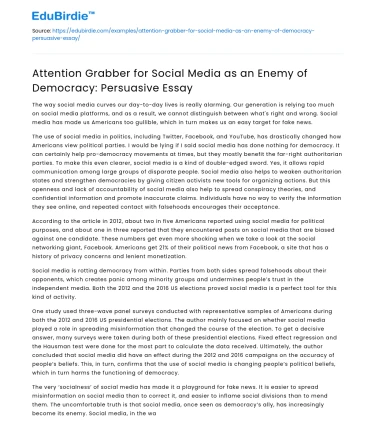The way social media curves our day-to-day lives is really alarming. Our generation is relying too much on social media platforms, and as a result, we cannot distinguish between what's right and wrong. Social media has made us Americans too gullible, which in turn makes us an easy target for fake news.
The use of social media in politics, including Twitter, Facebook, and YouTube, has drastically changed how Americans view political parties. I would be lying if I said social media has done nothing for democracy. It can certainly help pro-democracy movements at times, but they mostly benefit the far-right authoritarian parties. To make this even clearer, social media is a kind of double-edged sword. Yes, it allows rapid communication among large groups of disparate people. Social media also helps to weaken authoritarian states and strengthen democracies by giving citizen activists new tools for organizing actions. But this openness and lack of accountability of social media also help to spread conspiracy theories, and confidential information and promote inaccurate claims. Individuals have no way to verify the information they see online, and repeated contact with falsehoods encourages their acceptance.
Save your time!
We can take care of your essay
- Proper editing and formatting
- Free revision, title page, and bibliography
- Flexible prices and money-back guarantee
According to the article in 2012, about two in five Americans reported using social media for political purposes, and about one in three reported that they encountered posts on social media that are biased against one candidate. These numbers get even more shocking when we take a look at the social networking giant, Facebook. Americans get 21% of their political news from Facebook, a site that has a history of privacy concerns and lenient monetization.
Social media is rotting democracy from within. Parties from both sides spread falsehoods about their opponents, which creates panic among minority groups and undermines people’s trust in the independent media. Both the 2012 and the 2016 US elections proved social media is a perfect tool for this kind of activity.
One study used three-wave panel surveys conducted with representative samples of Americans during both the 2012 and 2016 US presidential elections. The author mainly focused on whether social media played a role in spreading misinformation that changed the course of the election. To get a decisive answer, many surveys were taken during both of these presidential elections. Fixed effect regression and the Hausman test were done for the most part to calculate the data received. Ultimately, the author concluded that social media did have an effect during the 2012 and 2016 campaigns on the accuracy of people’s beliefs. This, in turn, confirms that the use of social media is changing people’s political beliefs, which in turn harms the functioning of democracy.
The very ‘socialness’ of social media has made it a playground for fake news. It is easier to spread misinformation on social media than to correct it, and easier to inflame social divisions than to mend them. The uncomfortable truth is that social media, once seen as democracy’s ally, has increasingly become its enemy. Social media, in the way that it’s used now, is an authoritarian medium.






 Stuck on your essay?
Stuck on your essay?

